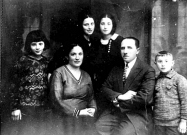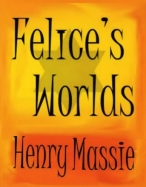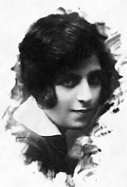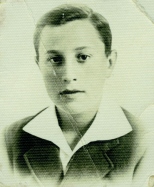|
Chapter One:
|
|
|
|
 |
|
Ozerowicz Family
[L-R]: Miriam, wife Bela
(nee Grzymkowski) Ozerowicz, Fela, Hanka, husband Moshe Ozerowicz, and Berci |
|
| |
|
I was the eldest of 4
children. I was born during Chanukah in 1910. My siblings were Hanka born in
1914, Miriam born in 1920, and Berci, my brother, who was born in 1925,
I don't exactly remember. My father Moshe ran a grain exporting company, ZBOZOBOL, and was also the mayor of Szczuczyn for a time. My mother Bela (nee
Grzymkowski) Ozerowicz was the daughter of Mindel and Reuben Grzymkowski from
Kolno. My father exported grain, primarily wheat, to places like Konigsberg [now
called Kaliningrad, the most western point in Russia], which was the capital of
Prussia at the time, and even to Finland. He traveled there often on business.
|
|
|
 |
|
Download Power Point File above (Note it is a very large file; best to
save to your desktop and view or play slide show from there) |
|
|
|
|
|
I don't remember our
first house, but I do remember our second house, the one that my father had
built. Downstairs was the dining room/living room. In it was a couch, a table,
and a chair, plus a tall mirror that reached to the ceiling and had two drawers
near the bottom. This mirror was a sign of "respectability" in those days. On
the first floor we also had a large kitchen with electricity, as well as my
father's study, which had a desk and a chair. Although my father's office was
not in the house, he did set aside a room for himself where he could meet with
business people (if they came to our house) and also work in the evenings. Also
downstairs was the large bedroom for my parents, which included the beds and a
closet. My bedroom was upstairs, but I do not remember where my sisters slept. I
do remember that Berci slept on the couch in the living room. We had no running
water in the house and the maids had to go to a well and pump the water and then
carry it into our home.
Szczuczyn had about
6,000 souls, mostly Jewish. The Jews were primarily involved in small commerce,
such as owning shops, and being a butcher, a tailor, or a dressmaker. The
majority of the Jews spoke Yiddish, although the younger generation spoke
Polish. We spoke only Polish at home. I understood my parents when they spoke
Yiddish and understood my fellow townspeople as well, but my Yiddish was not
really perfected until I went to live with my maternal grandparents in Kolno
[18.3 miles SW of Szczuczyn], where I went to a Polish school that admitted a
few Jews. It was after I finished the early primary grades of school in
Szczuczyn that I then continued my education in Kolno. I would travel home to
Szczuczyn from Kolno for vacations. I remember one vacation when I traveled
home in the dead of winter in a sleigh pulled by horses. It must have been about
20 degrees below zero and as we drove through the forest, I saw wolves. I almost
fainted, but the driver lit a torch to scare away the wolves. He said, "Now the
wolves will be scared of us."
|
|
|
|
 |
|
Henry Massie tells the extraordinary story of his mother Felice's life
after escaping the Nazis. |
|
|
| |
|
 |
|
| |
|
 |
|
|
|
|
My parents were
freethinking Jews. They were not really observant although they did attend the
synagogue on Rosh Hashanah and Yom Kippur. We did, however, keep kosher, since
my mother was brought up that way. I remember one time that I went to synagogue
with my parents for Yom Kippur. We had to sit there for the whole day with only
one break in the middle of the day. You can be sure, however, that I did not
fast. I considered myself a Progressive Socialist. Abram Nissen, a good friend,
and Isaac Slutsky [Slucki], another good friend from Szczuczyn, and I came home
to my house and we ate everything that my mother made for breaking the fast on
Yom Kippur. My mother was very upset when they returned home and said to my
father, "You have to spank her now." Nissen settled in Chicago about
the same time that I came to the USA, in 1938. There was not a Jewish
intellectual who went to school and studied all night who wasn't a Socialist. In
our gatherings we put on plays with many references to Socialism. This was in
Vilna [Lithuania]
where I attended gymnasium. I went there after I graduated from school in Kolno,
and I was the only student there from Szczuczyn.
After I graduated from gymnasium in Vilna, where I excelled in the humanities
and almost flunked math, I went to university in Nancy, France where I studied
dentistry. Most of the Jewish students there were from Poland and Romania
because the anti-Semitism in both of those countries was very strong and Jews
were prohibited from attending universities there.
Chapter Two:
When I was about 11
years old, I went to the Polish School in Kolno to study. I had finished school
in Szczuczyn and my parents sent me to Kolno, where my maternal grandparents
(Ruben and Mindel Grzymkowski) lived. I was to live with them during the school
terms and attend the exclusive Polish school. I was the only Jewish girl in that
school. There was also a Jewish boy, though he subsequently left because he
didn't like the anti-Semitic airs in the school. He left and went to a gymnasium
in Lomza. He was a Zionist and belonged to Shomer HaZair.
I didn't feel any
anti-Semitism there and my best friend was Irina Radzikowska, a gentile Polish
girl from Szczuczyn. We always traveled together, back and forth, from Szczuczyn to
Kolno. Irina was wonderful with me, but I believe that her mother was
anti-Semitic. I remember her saying to me, when I went over to her house one
time, "For a Jewish young woman, you are awfully nice." In school, I do not
remember any anti-Semitism at that time. I was a very good student and I think
that the teachers respected me for that.
I stayed with my
grandparents when I first started to attend school in Kolno, but my grandfather
became upset and almost embarrassed with my school schedule. I had to go to
school six days a week, which included Saturday mornings. He couldn't stand it
and so I went to live with two Jewish ladies, sisters, who lived next door to my
grandparents. They didn't care that I went to school on Saturday.
I came home only for
vacations, and of course, for the long three-month summer vacation. I had
friends in Szczuczyn and we would get together whenever I came home. I was the
only girl that went away to school, so of course my friends wanted to know what
everything was like. We would go on long walks and hikes to the Polish towns
nearby, we swam in the Bug River, and of course, I read many books.
I would generally stay
home until after Rosh Hashanah and then return to Kolno. I believe that my
parents would only go to synagogue twice a year: for Rosh Hashanah and for Yom
Kippur. We weren't really religious and I never fasted for Yom Kippur. Sometimes
my friends would come over to my house to eat on Yom Kippur, which would make my
parents very angry.
My parents only spoke
Yiddish to each other when they didn't want us to understand. But I understood
every word they said and my sisters and I would laugh about it. One reason I
learned Yiddish so well was because my grandparents in Kolno spoke Yiddish. We
spoke Polish at home, and in
addition to the Polish language, I also studied German and Latin at school. I
was able to speak fluent German and sometimes even conversed with my father in
German, a language that he was fluent in, because of his business dealings in
Konigsberg.
My father was a grain
exporter and his competitor was Mr. Farberowicz, who had two daughters. One
daughter went to Vilna, where I attended gymnasium after I finished school in
Kolno. However, she only stayed a year in Vilna and then returned home, whereas
I stayed at the Etta Dziecielska Gymnasium for three or four years.
Since I was the eldest
in the family, I was fortunate to be able to go to school in Kolno and then in
Vilna. By the time my sisters and young brother were of age to go, they couldn't
do so because of Hitler and the fact that my father lost his license to export,
thanks to the anti-Semitic Polish government of Skladowski. After that
everything got worse and worse.
|
|
|
|

|
|
Fela Ozerowicz
Vilna, 1928 |
|
|
| |
|
When I was in Vilna, I
especially liked to study the humanities, in which I excelled. For math, I had
no head whatsoever and my father threatened to kill me when he once saw my
report card with such a low math grade on it. I remember that even the principal
of the school called me into his office and expressed surprise that such an
excellent student could do so poorly in math, but I told him the truth: I
couldn't do any better. I had no head for it.
I remember that in
Vilna I had a marvelous professor of history, Professor Freund. He was a very
assimilated Jew and in my last year at the gymnasium he took me to a meeting of
some progressive intellectuals in Vilna and introduced me. Of course, I was very
flattered and someone said, "I hope that you will join our party." I was too
embarrassed to ask, "What party?"
I was a progressive too
and wasn't a Zionist. I felt that borders and the establishment of a new Jewish
state would just cause more anti-Semitism and greater nationalism, something the
world could do without.
After Vilna, I came
home and had a few months at home before I went to Nancy, France to the
university there to study dentistry. Why did I go to France and not to the
famous Stephan Batori University in Vilna? Well, Isaac Slutsky, who lived next
door to me went to the Sorbonne, told my parents how wonderful France was and
they listened to him. Isaac was the son of Basha Slutsky, and although he was
about 5 years older than I, I think he loved me. After I learned French, Isaac
and I would communicate and talk in French. His Sorbonne French was magnificent.
Isaac was very nice and he had two brothers, both of whom were as brilliant as
he was. Isaac also had two sisters. One sister never talked and just stood and
stared, and other one was a midget. His father was very wealthy and not at all
liked because he was a moneylender.
So I went to university
in France and my first two years were good financially because my father was
able to send me a monthly allowance for my expenses. Then his license was taken
away and he could no longer work and he could no longer send me money. A Jewish
friend from Romania who studied medicine in France helped to support me. Without
him I couldn't have made it. I graduated with a degree in dentistry.
Whenever I would go
home to Szczuczyn from France, I took the train either via Prague or via Berlin.
Most of the time I would go via Prague because two close friends of mine from
Vilna lived in Prague. They were first cousins and were brilliant doctors. One
surname was Zak and the other was Zakimowicz.
|
|
|
|
 |
|
Berci Ozerowicz, 1940-41 |
|
| |
|
Postscript:
After France, it was
clear that I could not stay in Poland and that there were no professional
opportunities for a young Jewish woman in Poland. A man from Szczuczyn who had
immigrated to Palestine came home to visit and told my parents about the job
opportunities there. So my father bought me a false marriage, since that was the
only way of immigrating at that time, and I went to Palestine. I worked for many
Arab dentists since they needed a female dentist to work with their female
clientele and who spoke French. But Palestine wasn't for me, with all the
fighting and the upheaval. By then my two sisters had immigrated to Palestine: Hanka and Miriam. They stayed and got married there and I left for the USA where
a Grzymkowski uncle lived near to New Haven, Connecticut. I got a job teaching
French to the daughters and wife of the President of Yale University. After that
I had to take some classes in dentistry so that I could practice in the USA and
was accepted by Washington University in St. Louis, Missouri. I went to classes
but never practiced dentistry in the USA. I married Dr. Edward Massie, with whom
I had two sons: Henry and Barry (named after my beloved brother Berci who was
killed by the Nazis). Berci was found a few days before liberation, hung in the
forest. He was involved in the Jewish Polish resistance. My father was shipped
off to Siberia where he managed a grainery during the war and my beloved mother
was gassed at Auschwitz.
|